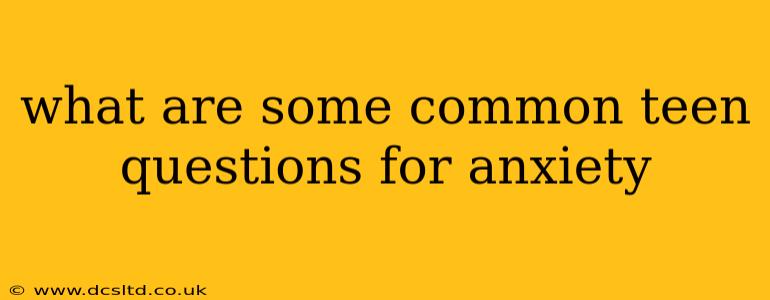Common Teen Questions About Anxiety: Navigating the Twists and Turns of Adolescent Life
Teenage years are a rollercoaster! Physical changes, social pressures, academic demands, and the ever-present quest for identity can leave even the most resilient teens feeling overwhelmed. Anxiety, a common companion during this period, often manifests in a flurry of questions. Let's explore some of the most frequently asked questions teens have about anxiety, offering insight and reassurance along the way.
What is anxiety, exactly? Is it normal to feel anxious sometimes?
Anxiety is a natural human response to stress. It's that feeling of unease, worry, or nervousness that everyone experiences from time to time. However, for teens, anxiety can become more significant when those feelings become excessive, persistent, and interfere with daily life. Feeling anxious occasionally is perfectly normal; it's when these feelings dominate your thoughts and actions that it might indicate an anxiety disorder. Think of it like this: feeling nervous before a big test is normal; feeling so overwhelmed by test anxiety that you can't study or even leave your house is not.
Why am I feeling so anxious all the time? What are the causes?
The causes of anxiety in teens are multifaceted. Hormonal changes during puberty significantly impact mood and emotional regulation. Academic pressures, social dynamics (fitting in, navigating friendships, romantic relationships), family issues, and even significant life events (moving, loss, trauma) can all contribute to heightened anxiety levels. Sometimes, underlying medical conditions or genetic predispositions play a role as well. Understanding the root causes can be crucial in finding effective coping strategies.
How can I tell if my anxiety is more than just normal teenage stress?
This is a crucial question, and honestly, only a mental health professional can provide a definitive answer. However, some red flags include:
- Persistent worry: Excessive worry about various aspects of life, lasting weeks or months.
- Physical symptoms: Frequent headaches, stomach aches, difficulty sleeping, trembling, rapid heartbeat, and shortness of breath.
- Avoidance behaviors: Avoiding social situations, school, or activities that trigger anxiety.
- Impact on daily life: Difficulty concentrating, completing schoolwork, maintaining relationships, or engaging in enjoyable activities.
- Intrusive thoughts: Recurring negative thoughts, fears, or images that are difficult to control.
If you're experiencing several of these symptoms, reaching out to a trusted adult—a parent, teacher, counselor, or doctor—is vital.
Is there a difference between anxiety and depression? Can I have both?
Yes, anxiety and depression are distinct but related conditions. Anxiety involves excessive worry and fear, often manifesting as physical symptoms. Depression involves persistent sadness, loss of interest, and feelings of hopelessness. Importantly, teens can experience both anxiety and depression simultaneously, a condition known as co-occurring disorders. This is not uncommon and requires comprehensive treatment.
What are some ways I can manage my anxiety naturally?
Several strategies can help teens manage anxiety naturally:
- Exercise: Physical activity releases endorphins, which have mood-boosting effects.
- Mindfulness and meditation: These techniques help to calm the mind and reduce overthinking.
- Healthy diet and sleep: Nutrition and sleep are foundational for mental well-being.
- Stress-reducing techniques: Deep breathing exercises, progressive muscle relaxation, and yoga can be helpful.
- Social support: Connecting with friends, family, and supportive adults can provide comfort and reduce feelings of isolation.
What kind of treatment options are there for anxiety?
Treatment for anxiety usually involves a combination of approaches:
- Therapy: Cognitive Behavioral Therapy (CBT) is highly effective in helping teens identify and change negative thought patterns and behaviors that contribute to anxiety.
- Medication: In some cases, a doctor may prescribe medication to help manage anxiety symptoms. This is usually considered when other approaches haven't been sufficient.
Remember, seeking help is a sign of strength, not weakness. If you’re struggling with anxiety, don't hesitate to reach out to a trusted adult or mental health professional. There's support available, and you don't have to navigate this alone.
